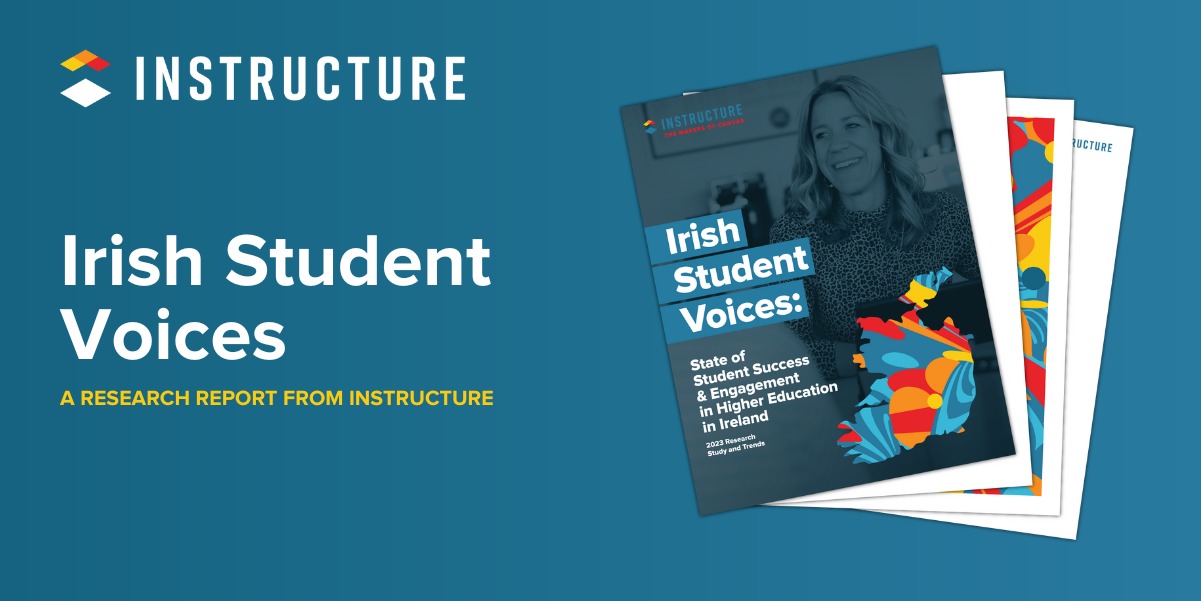Irish students place skills-based learning at the top of student success factors, Instructure survey reveals

74% of Irish students say being work and career ready demonstrates academic accomplishment
Today Instructure, the leading learning platform and maker of virtual learning environment Canvas*, reveals that seven in 10 Irish university students believe skill competency and skill diversity (69%) are the most significant measures of success while at university, and are key to preparing them to enter the workforce. The data is part of a survey conducted by Hanover Research and commissioned by Instructure: Irish Student Voices: State of Student Success & Engagement in Higher Education in Ireland.
These findings come at a time when employers are increasingly turning to skills-based hiring. Rather than focussing on past employment, organisations are looking for candidates with a set of skills that enable them to succeed in a particular role. Research** shows that skills-based hiring is a more accurate indicator of job performance, being five times more predictive than hiring based on education and prior work experience alone.
The new report from Instructure launches amid the backdrop of the most significant education legislation in Ireland in the last 50 years. This includes the HEA Act, which aims to provide better student engagement, equitable access to education and promote lifelong learning, in addition to historic change in third-level education as Minister Harris announces degree programmes available outside the points system.
Daniel Hill, EMEA Regional Vice President at Instructure, says
“It’s a time of change for students and universities in Ireland, as the HEA Act looks to address the changing needs of learners and employers. Technology is a vital driver in increasing flexibility and student access and engagement, allowing them to easily demonstrate their skills to future employers. This is especially critical as our survey found that 90% of students are in some form of employment while studying”.
Need for connections and access while studying is on the rise
Students crave greater connection and access while at university. Providing coursework and materials online is critical, enabling students to engage with their learning at a place and time that suits them best.
Students want to engage with learning online – two-thirds (67%) say they want to be in a blended or online learning environment. Gen Z students are digital natives and expect technology to be integrated as part of learning. In addition, more than 50% of respondents have a dependent, meaning that across the board, flexibility is needed in how and where they learn – and technology plays a key role in delivering this access. Nearly all (86%) believe available technology has the biggest impact on student success – and this is where virtual learning environments (VLEs) can support both students and universities.
While three-quarters (73%) of universities surveyed are currently using VLEs to share materials or seven in ten (71%) for homework or assignments, less than half (47%) use it for collaboration. Using technology to engage students and provide a platform for engagement is critical. Implementing more peer interaction and teamwork assignments (42%) both in the classroom and via VLEs will drive student engagement and ultimately, student success.
Other key findings from the research includes:
- Technology plays a role in success and engagement – 63% of students would be interested in using mobile apps to access course materials, 58% to submit assignments and 67% to receive comms from professors.
- Good mental health is a key component of success – 72% say success is about more than grades or marks, as students want to do well, but not at the expense of their mental health. Access to mental health resources (88%), adequate sleep (87%) and psychological wellbeing (85%) all impact student success
- Universities are supporting students’ mental health – 56% of students say university’s address mental health issues well, providing resources like in-person or virtual counselling and campus wellbeing events (51%)
- Students enjoy online learning – 69% of students view learning online positively
*Research commissioned by Instructure and carried out by Hanover Research in February – March 2023.
**Data from McKinsey and Company, November 2022.











Responses